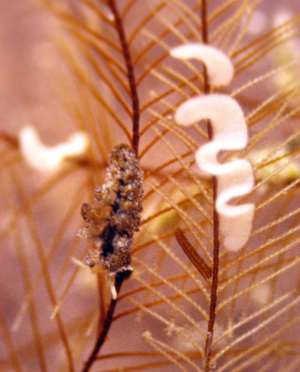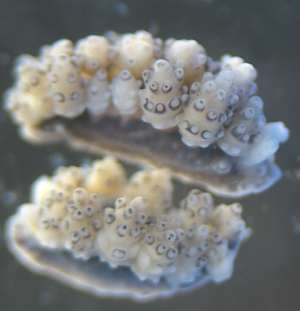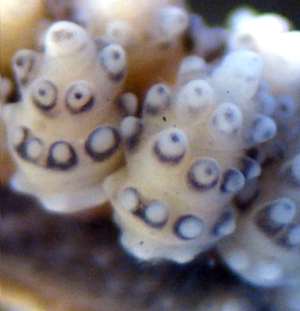
Doto lancei
Marcus & Marcus, 1967
Order: NUDIBRANCHIA
Suborder: DENDRONOTINA
Family: Dotidae
DISTRIBUTION
Mission Bay, San Diego, California (Behrens 1991) to Costa Rica (Camacho-Garcia et al., 2005). Note: the record of this tropical species from Monterey Bay (see Behrens 2004) requires confirmation.
PHOTO
Upper: Bahia Concepcion, Baja California Sur, Mexico, Gulf of California. Depth: 1 m. Length: 5 mm. September 1985. Mixed cobble/sand bottom. Lower: Punta La Gringa, Bahia de Los Angeles, Intertidal, Baja California, Mexico, Gulf of California, April 2000, Rocky shore. Length: 4.5 mm (preserved). Photos: Jeff Goddard
Doto lancei has brown to black pigment on the body, head, lower rhinophore sheaths and cerata, and this pigmentation can sometimes be dense [upper photo]. Many of the cerata tubercles have a dark, subapical ring, and the more distal of these usually have a dark apical spot. This dark pigmentation persists in preserved specimens [lower photo]. The rhinophores and upper rhinophore sheaths are transparent and contain numerous opaque white inclusions, which also occur less densely on the accessory gills and on the dorsum.
Doto lancei has 7 to 8 pairs of cerata, measures up to about 8 mm long, and is found, with its egg masses, associated with species of the hydroid Aglaophenia. It produces small, planktotrophic larvae (Goddard 2005).
A fine image of Doto lancei taken by Jim Lance is available at: http://slugsite.us/bow/pan/lancei.html
- Behrens, D.W. 1991. Pacific Coast Nudibranchs. Sea Challengers, Monterey, California. 107 pp.
- Behrens, D.W. 2004. Pacific coast nudibranchs, supplement II new species to the Pacific coast and new information on the oldies. Proceedings of the California Academy of Sciences, 55: 11-54.
- Camacho-Garcia, Y., Gosliner, T.M., and Valdes, A. 2005. Field Guide to the Sea Slugs of the Tropical Eastern Pacific. California Academy of Sciences, San Francisco, California. 129 pp.
- Goddard J.H.R. 2005 (for 2004). Developmental mode in opisthobranchs molluscs from the northeast Pacific Ocean: feeding in a sea of plenty. Canadian Journal of Zoology, 82: 1954-1968.
- Marcus Ev. and Marcus Er. 1967. American opisthobranch mollusks. Studies in Tropical Oceanography, 6: 1-256.


Goddard J.H.R., 2006 (February 13) Doto lancei Marcus & Marcus, 1967. [In] Sea Slug Forum. Australian Museum, Sydney. Available from http://www.seaslugforum.net/find/dotolanc
Related messages
Fact sheet for Doto lancei
February 13, 2006
From: Jeff Goddard
Hi Bill,
Here is a Fact sheet for Doto lancei.
Best wishes,
Jeff
goddard@lifesci.ucsb.edu
Goddard, J.H.R., 2006 (Feb 13) Fact sheet for Doto lancei. [Message in] Sea Slug Forum. Australian Museum, Sydney. Available from http://www.seaslugforum.net/find/15812Dear Jeff,
Thanks for helping to sort out these species of Doto. They are certainly a group that needs input from those with local knowledge of the species.
Best wishes,
Bill Rudman
Doto lancei from the Gulf of California, Mexico
January 31, 2006
From: Jeff Goddard

Hi Bill,
Here are two not-very-good, but-all-I-have images of Doto lancei, for comparison with the other species of Doto with dark pigment (Doto kya and Doto columbiana) known from the NE Pacific Ocean.
Locality: Bahia Concepcion, Baja California Sur, Mexico, Gulf of California. Depth: 1 m. Length: 5 mm. September 1985. Mixed cobble/sand bottom. Photographer: Jeff Goddard
Best wishes,
Jeff
goddard@lifesci.ucsb.edu


Thanks Jeff,
Bill Rudman
